Rami Ismail, cofounder of Nuclear Throne maker Vlambeer, became frustrated trying to get visas approved for developers to come to the U.S. for his #1ReasonToBe diversity panel at the Game Developers Conference. Each year, applicants would get rejected. On top of that, one of the French-speaking speakers from Madagascar got low ratings because he spoke with a French accent.
So Ismail, who won a Special Ambassador award at the GDC last year for his efforts to promote diversity and indie game developers, rallied his friends and is announcing today a new online-only global game developer event, dubbed GameDev.World. (Ismail is going to be a speaker at GamesBeat Summit 2019, April 23-24 in Los Angeles).
Ismail is unveiling the event at a talk at the Global Game Jam keynote, which was first shown in New Zealand but will be viewable around the world in 24 hours. The event will take place June 21 to June 23, and it will be broadcast on a number of livestream platforms, including Twitch, Mixer, Facebook Gaming, and YouTube. The talks will focus on the craft of game development, and they will be translated into English, French, Spanish, Portuguese, Russian, Arabic, Chinese, and Japanese.
To handle the challenges of translation, speakers will submit their solo talks ahead of time for translation, but some of the conversations, including questions and answers, will be translated in real time, Ismail said. Even with high translation and streaming costs, Ismail said the online only event won’t have a lot of costs, since no one has to travel to it.
June 5th: The AI Audit in NYC
Join us next week in NYC to engage with top executive leaders, delving into strategies for auditing AI models to ensure fairness, optimal performance, and ethical compliance across diverse organizations. Secure your attendance for this exclusive invite-only event.
Ismail said in an interview with me that this is the biggest project he has undertaken. And that’s after he worked with 350 game developers on Meditations, a project that launches a game a day to help people relax.
Here’s an edited transcript of our interview.
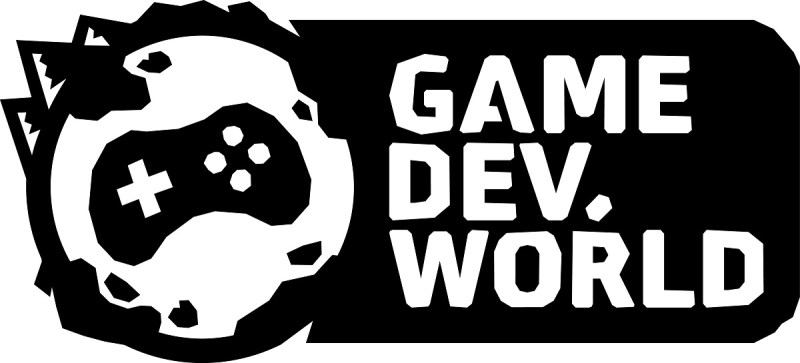
Above: GameDev.World is a new online only conference.
GamesBeat: What’s the state of the conference now? How do you think it’s solidified?
Ismail: Things are going well. We’re ready to announce on the 25th. It’ll go live with the first Global Game Jam keynote, whenever that starts in New Zealand. We’re calling it GameDev.World. Just one word, like a URL. It’s been a good few weeks. We’ve been lining up speakers for announcement later. We’ve been lining up sponsors. We have dates now, June 21-23. It will be on as many platforms as we can possibly support, but the main ones we’re aiming for will be Twitch, Mixer, Facebook Gaming, and YouTube.
GamesBeat: Do you have any announced sponsors yet?
Ismail: We currently don’t have announced sponsors. There are a number of larger sponsors, but because they’re in different parts of the process, we can’t announce one without the others. One of those fun things.
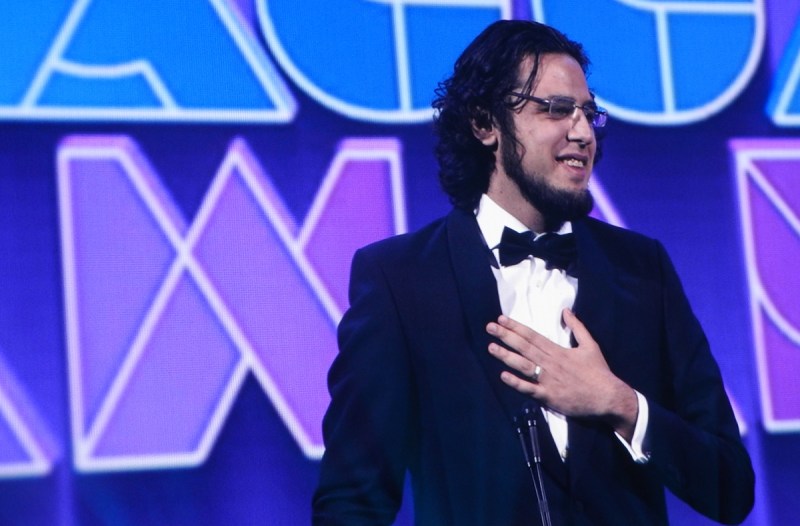
Above: Rami Ismaail, cofounder of Vlambeer, accepts Ambassador Award at GDC Choice Awards.
GamesBeat: Can you tell me again about how you got the idea for the conference?
Ismail: The conference started for various reasons. The two big ones — I travel around the world, and one thing I kept noticing was that in all these different territories, where different languages are prevalent, you notice that the industry is very segregated by language. More than anything else, really. It’s segregated by gender in some ways, and by countries, but the biggest invisible border in our industry is language.
I’d be in Russia at a conference with all these speakers who are super well-known. People respect their vision, respect their views. I’d be in the Arab world, or in China, or in Africa, or France, and it’s the same. But I’d never heard of these people because they don’t go to English-language conferences and vice versa. It just baffles me that there’s so much knowledge around the world that we can’t or don’t access, just because of language.
The other thing is, I organized a panel at GDC called #1ReasontoBe. One of my speakers there last year had a relatively noticeable French accent. He’s from Madagascar. People found him very hard to understand. That was one of the common pieces of feedback that we got for that specific talk. That just made me very sad, because yeah, absolutely, it took more effort to listen and understand what he was saying, but he was reading from a script. He flew over from Madagascar, 10 hours north to Europe and 10 hours west to the United States, and the feedback is that he’s hard to understand? That can’t be the reality. This kid is doing amazing work making a Madagascar-inspired racing game, and then the feedback is he’s hard to understand. Why can’t he speak in his own language?
That was the other inspiration. I was just upset. Partially upset at that and partially just surprised that we haven’t made these kinds of efforts earlier, together, to combine into something like GameDev.World.
GamesBeat: There’s also the trouble with a lot of visas being denied in the United States.
Ismail: Yeah, last year with the visas is obviously a huge issue. That’s another aspect of GameDev.World. Since it’s a live stream conference, we immediately skip all the issues of a conference being in a location. We don’t have to deal with visas or travel costs or hotels or conference buildings. It just is. If you want to be part of it, you can be part of it, no matter where you are, no matter your nationality, no matter your legal status in a country, no matter your ability to pay. You want to be part of this? If you have an internet connection you can join us and watch every talk that everybody else does.
GamesBeat: And you have translation set up?
Ismail: Yes, we’ll translate all our talks into the eight major languages of the world, eight of the most written languages on earth. It’ll be English, French, Spanish, Portuguese, Russian, Arabic, Chinese, and Japanese. All of those translations will be available through closed captioning, and speakers can speak in whatever language they prefer. If you ever want to hear what a game developer’s talk sounds like in a different language, this is your shot.
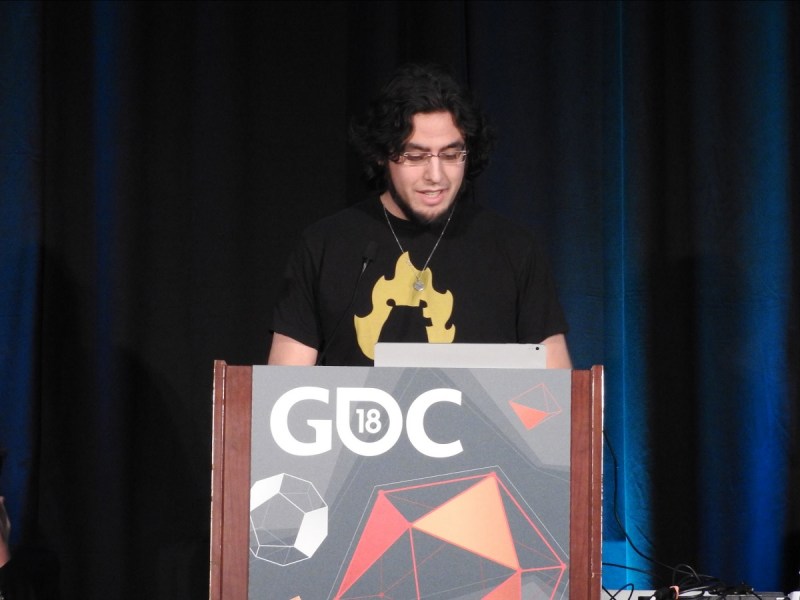
Above: Rami Ismail at the #1ReasonToBe at GDC 2018.
GamesBeat: It still sounds like there’s a lot of logistics to take care of. Just a different kind.
Ismail: This is by far the most ambitious project of my life. I’ve done a lot of ridiculous projects, from flying six people to San Francisco for One Reason to Be, making video games, starting a company, getting 350 developers to work together for Meditations — I’ve done some ambitious stuff in my life. This is effectively a small crew of a few people and an advisory board of five total trying to do a multinational broadcast for 48 hours with remote content. It took us three years to get to the point where we’re confident enough that we can do it. I guess we’re there now. It’s very exciting for the team.
GamesBeat: How long is it going to run altogether?
Ismail: The content of the conference is going to be 24 hours, but a large part of it will be broadcast twice, so that no matter what time zone you’re in, you have time to watch it. If you’re in New Zealand you don’t have to be awake at 3 a.m. to join in. You’ll have access to all the content during normal hours, no matter where you are.
GamesBeat: Is that through recorded playback, or are you actually just airing it twice?
Ismail: We’re going to ask all speakers to do their talks twice. Once during the day and once during the night. In cases of technical emergency, we’ll also have all the speakers do a pre-recorded version of their talk, because some of our speakers will be in locations where the internet is less than dependable. We’ll make sure their talks are not lost in case of internet failure or power failure. We want to make sure that there’s a video backup.
We’re also doing it live because part of the show is that there will be Q&A sessions for each and every talk. We’ll be collecting questions during the talk via chat in all the languages we support, and if we can get a volunteer effort up, in languages that we do not currently support as well. The official translation is done through a translation company and a broadcasting company, but obviously we want to make this as inclusive as possible. It’s just that because of budgets and logistics, it’s not possible to do more than those languages. But obviously if there are people watching who want to volunteer, we’ll take questions in any language that we can translate and get the logistics in order for. At the end of each talk there will be a Q&A segment where the speaker can pick some questions to answer in their native language and we’ll translate those back.
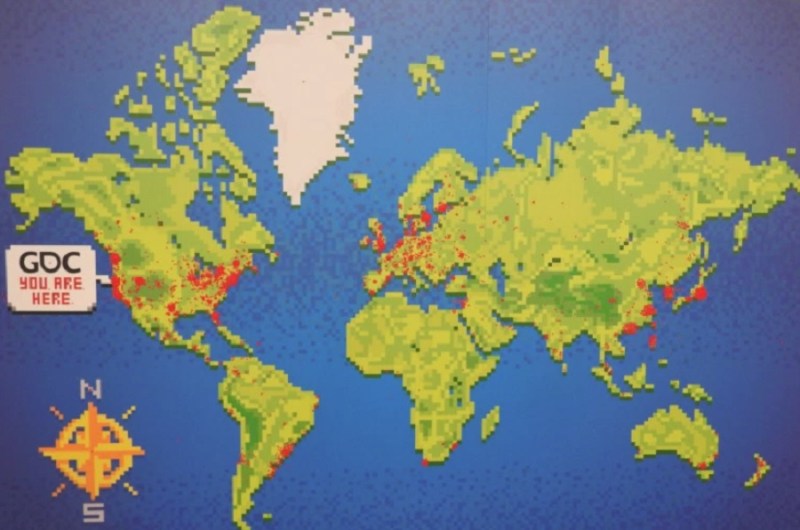
Above: A map of where the attendees for GDC 2018 came from.
GamesBeat: It sounds like it’s going to be accessible to billions of people.
Ismail: It should be. That’s the hope. We looked at what languages would be understandable for as many people as possible and picked those. There’s obviously enormous logistical challenges. Just talking to the main video platforms around the world — as far as I can tell, nobody has done a closed-captioned, translated video stream before. There’s been transcribed subtitles, so you know what will be said up front, and everyone keeps to a script, but we’re also dealing with people who might go off script, who might not say exactly what’s in the script. Translating that live –there’s no technical support for that, no tools. And the technical challenges are also very interesting to overcome.
GamesBeat: You’re going to be testing the internet here.
Ismail: We’re going to do some interesting stuff, yeah. It’s my hope that by the end of this, we’ll be able to make the tools that we develop available online for free. Not only will we release the video files and the transcriptions and the Q&A, but we’ll hopefully also release some of the tools we’ve developed to do a multilingual stream. If anyone else wants to try this, aside from the translation capacity, they have the tools to do it.
GamesBeat: There wasn’t really another conference you could crib from here.
Ismail: There wasn’t. We’ve had some help from existing events. Some of the people that help out with AGDQ helped us out, because they have a lot of knowledge about event logistics. Some of the people at Global Game Jam helped us out, because they have access to a worldwide network of universities and schools and other locations that have good internet connections.
The organizer of Pro Indie Dev, an indie-focused online conference, is on our advisory board, Gabriel Dal Santo. He’s the only one, as far as I know, who’s done a fully online game conference before. But not multilingual or multinational, and not focused on the industry at large. Pro Indie Dev is an amazing conference. It was part of what made me believe that this is possible. I’m happy to have Gabriel on board.
GamesBeat: How did you put together the group you’ve formed to get this going?
Ismail: I started with Sarah Elmaleh, who’s a voice actress. She was part of the original idea behind GameDev.World when it was first introduced three years ago. The idea there was to translate documentation and important writing in the games industry into every major language in the world. But we immediately got responses from some of the major middleware creators, that they were already translating their work. We realized it wasn’t necessary. But we kept the brand, because we felt the name was evocative, and tried to find a new purpose for it. When we came up with the idea of an online conference, it made a lot of sense that this would be the name.
We started recruiting people that would want to be on the advisory board. We quickly established Gabriel. We also attracted Gwen Frey, formerly of the Molasses Flood. She’s an artist, but also organizes online meetups for artists. We have Houssem Ben Amor, who is a Global Game Jam board member. Between those five, we’ve been working on this. We also cover most of the continents on earth with our group.
GamesBeat: Is this going to be expensive to put on?
Ismail: It’s very expensive. The translation alone is way more than I ever thought it could have been. We’re trying to make sure everyone has the same hardware. Everyone gets the same laptop and webcam and microphone so we have a consistent level of quality between the speakers. Everyone gets the same backdrop. Just with that, for 30-plus speakers, sending hardware around the planet, plus the translation services and wanting to make sure we can pay everyone who works on the project–the advisory board and me and Sarah, we’re not going to make any money off of this. But everyone who joins us on this journey — the logistics people, the translation crews, the hardware — we want to make sure they get a reimbursement.
We’ve been trying to get as many sponsors as possible, and not just for the money, honestly. Financially I think we can make it work. But mostly it’s because I really want the industry–I want the platforms, the middleware companies, the other events to show that they care about this. I want developers around the world who might feel excluded, or not part of the industry, I want them to see those logos there and think, “Okay, these companies do care. We can reach out to them.” If there’s a hardware platform that they want to work with, a console, a PC platform, these companies care, and you as a developer matter no matter where you are.
GamesBeat: What sort of topics are going to be the focus?
Ismail: We’re going to be covering both independent and triple-A topics. We’ll be doing design, art, code, sound, production, and marketing. We’re very explicitly avoiding business as a main topic of the conference. We’ll have some abstracts or specific business talks, but we’ve realized that business as a topic is simply not a global subject. There’s no good way to talk about business in a way that isn’t completely meaningless in another territory. If you talk about the business in the United States, well, starting a business in China has very different challenges. Starting a business in Kenya has different challenges again.
Everything related to the creation of games, as well as production and in some ways marketing — the code, the art, the design, the audio — those are all pretty global. But the way you do business and get your game out there is just not a global subject. We’re avoiding that one, unless we’re doing a talk specifically about doing business in a particular country.
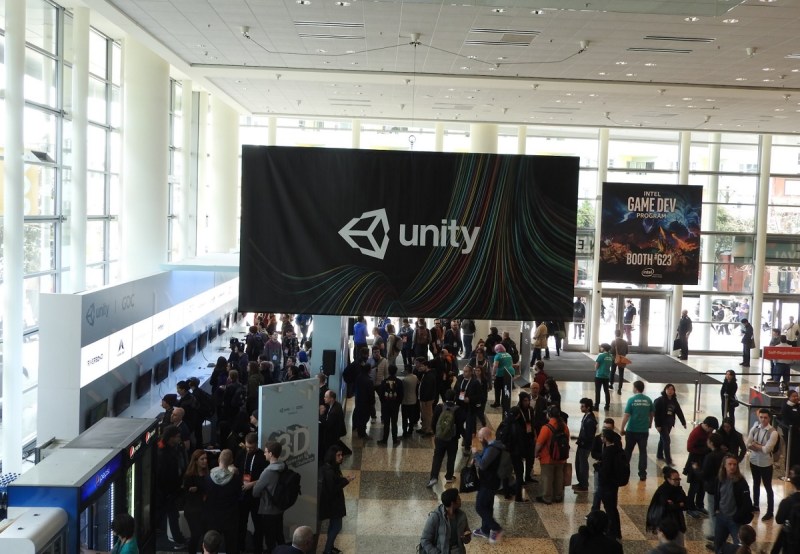
Above: GDC 2018
GamesBeat: Do you have a title or a theme that ties everything together?
Ismail: The theme for the first one is simply going to be introducing people to the idea that there is a global games industry. This is a global medium. The them, in many ways, is the first ever global games conference. Part of what we want to show is perspective and knowledge for entry-level developers and intermediate-level developers. We want to throw a conference that has topics that are of interest and that you can learn from. Insights into how the industry works, knowledge of how popular things are done or made.
For expert-level developers, obviously we can’t go too far in depth on a lot of topics, but what we can do for them that no other conference can is we can give them a global perspective on how the industry works in other places, how certain problems are solved in other places. Even though those won’t be deep dives in most cases, they’ll show that there are different ways of doing things in different places. For expert-level developers I think that will be interesting in itself.
GamesBeat: Will be running advertising as part of your sponsorship? Will it just be free to watch?
Ismail: The entire show is free for anybody to watch. Everything will be archived, uploaded, transcribed, and translated for free as well. As part of the sponsorship programs there will be a few sponsor moments in the show, just to make sure we can pay for this. From our end, there won’t be any ads. I don’t know if any of the video platforms will inject ads. We’ll work to make sure that they don’t, but obviously since we’re working with so many platforms I can’t guarantee there won’t be a single ad on any page. We’ll work our hardest to make sure that this as pure a thing as possible.
GamesBeat: You must have gotten good feedback already, to be going forward with it.
Ismail: Honestly, like I said, this is not a new idea. It’s been an idea for a few years. As a team we’ve just never had the confidence to go through with it. Partially it’s the logistics issues, partially resources, partially time, and partially the industry just wasn’t ready to accept that language was such a barrier. More and more, and also thanks to One Reason to Be at GDC, people are learning more about the globalization of the market, and especially the split between the English-speaking industry, the Japanese-speaking industry, the Chinese-speaking industry, and the rest of the world. People are way more ready to accept that not all of the games industry is in English, Chinese, or Japanese.
We’ve had very good feedback. A lot of people have been immediately excited. Sponsorship talks have been very straightforward, very pleasant. I think people are just ready to prove that this industry is a global industry. To show a world map, like I did at One Reason to Be — to show that world map for a conference where it actually looks like the whole world. We can do that. The conference doesn’t have to be in a place with a price for a language. It can be everywhere for free in as many languages as possible. It’s 2019. We can do this.


